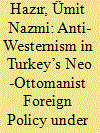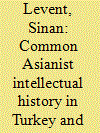| Srl | Item |
| 1 |
ID:
189831


|
|
|
|
|
| Summary/Abstract |
After 2013, Turkey’s foreign policy has been noted for neo-Ottomanist
rhetoric and anti-Western discourse, which resulted in the deterioration
of relations with the West. To disclose the patterns of anti-Westernism
in Turkish foreign policy, this paper analyzes official speeches of Turkish
President Recep Tayyip Erdoğan given at international meetings and
events from 2014 to 2021. Based on critical constructivism, which
underlines the co-constitutive relationship between identity and
foreign policy, and the role of the Other in identity construction,
this article demonstrates how the Western Other has been used by
Erdoğan in building Turkish Ottoman identity. This article articulates
the anti-Western notion of neo-Ottomanism and argues that Erdoğan’s
anti-Western discourse bears the Islamic undertone and relies on the
delineation of the Turkish-Ottoman Self from the Western Self.
|
|
|
|
|
|
|
|
|
|
|
|
|
|
|
|
| 2 |
ID:
191929


|
|
|
|
|
| Summary/Abstract |
China is looked upon warmly in the Arab world. Allegations about extreme human rights abuses by the Chinese government of Muslim populations in the Xinjiang Uyghur Autonomous Region, however, put the durability of this popularity into question. This article uses Arabic-language media sources to illuminate Beijing's efforts to neutralize this controversy for Arab audiences and the nature of the debate around the topic in the Arab media sphere. Widely sympathetic coverage reflects a synergy between Beijing's propaganda efforts and anxiety about Islamism among Arab regimes. In addition, this article argues that the leitmotif of anti-Westernism in Arab media suggests China's reputation reaps considerable reward from the fraught legacies of Western involvement in the Arab world.
|
|
|
|
|
|
|
|
|
|
|
|
|
|
|
|
| 3 |
ID:
144166


|
|
|
|
|
| Summary/Abstract |
This article proposes that Turanism played similar roles in Turkey and Japan in terms of forming a common Asianist thought, which can also be considered an anti-Western intellectual notion. Central Asia was depicted as irredenta, and Turanists in each country dreamed of independence for Turan-origin people in the region. Some of them even took action, as seen in the examples of Imaoka and Enver Pasha. Russia, as a member of the West, was othered in both countries. Togay, as a Russian Turkic-origin thinker, believed that Japan was a Turan-origin country, which had potential to dispose the Russian influence on Turkic people, which could enable their independence. Apart from Russians, Han Chinese played the villain's role due to the Mongolian, Manchurian, and East Turkestan questions. Turanism, which has been almost forgotten today, formed a common Asianist intellectual root in Turkey and Japan in the first half of the twentieth century.
|
|
|
|
|
|
|
|
|
|
|
|
|
|
|
|